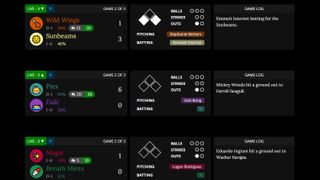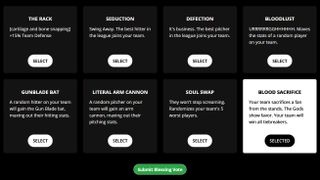Place bets on Blaseball, a simulated baseball league with the occasional Hellmouth
The browser-based sports gambling sim includes soul swaps, forbidden tomes, and pitchers with literal cannons for arms.

At the end of the first season of Blaseball (not baseball) the votes were tallied and the Forbidden Book was opened. A solar eclipse resulted. The umpires' eyes turned white, the Moab Desert was swallowed by a Hellmouth, and a player named Jaylen Hotdogfingers immediately burst into flames and was completely incinerated.
That's a pretty grim series of events, but things are tough everywhere. Right now real Major League Baseball has some major league problems—despite keeping fans away from the parks and protecting players with new rules and near-daily testing, COVID-19 is still sweeping through the majors the same way it's sweeping through the rest of the United States. Playing without fans is already really weird, and it's blatantly obvious to everyone (except the MLB apparently) that the already shortened and largely pointless season should be entirely shut down.
That sucks for baseball fans and players alike, yes. But at least in the meantime, there's Blaseball.
What is Blaseball? It's a website that simulates an off-kilter version of baseball. Each season lasts only a week. Members can follow games in real time and bet (entirely fake coins) on the outcomes. And rule changes and other events can be voted on during each season by fans who have subscribed. I just joined Blaseball yesterday and it's honestly quite fun to watch the games play out during the day and place bets on who you think will win.

When you sign up for Blaseball you're asked to pick your favorite team from a list that includes names like the Dallas Steaks, the Kansas City Breath Mints, the New York Millennials, the Breckenridge Jazz Hands, and the team I chose: the Canada Moist Talkers. You start with 300 coins and you can bet any game during the 99-game season (when your favorite team wins, you get a little payout, too, even if you didn't bet on them).
And if you spend some coins on a ticket, you can vote on future rule changes and other fun items in the Blaseball Election.
For instance, a new rule called The Forth Strike is up for a vote for next season, which would mean the worst four teams in the league will get four strikes before they strike out, instead of just three. Another potential rule means the team in last place will be completely eliminated at the end of the season (right now, my Moist Talkers are 4-3 so hopefully they won't slip any lower in the standings). There's another rule up for a vote that simply reads "Peanuts" with no extra information.
The biggest gaming news, reviews and hardware deals
Keep up to date with the most important stories and the best deals, as picked by the PC Gamer team.
Last season (last week), the winning vote was to open the Forbidden Book, so I'm guessing Peanuts, whatever it is, will win the vote this season. We'll find out on Sunday before the next season starts.

You can also vote on Blessings (I suspect Blaseball takes place in some Cthulhu-like universe) which have a chance to bestow improved stats on random players on your team. Your pitchers could grow extra thumbs, another might form a literal arm cannon, or a fan might be sacrificed to the Gods so your team automatically wins any tiebreakers leading into the post-season.
The gambling itself isn't complicated (and again it's not real money), but it's nice to have a little stake on the simulated games. If your betting isn't going well and you completely run out of coins, there's a button you can click to beg the Blaseball Gods for more money. There's even a book of Blaseball rules with many of them mysteriously grayed out.
Blaseball has been a weird and enjoyable distraction—I keep it running in a tab on my browser to check the scores and place bets every now and then. If you like betting on baseball, or want to see it played in a world with magic books, mutations, and blood sacrifices (but no COVID-19), you can sign up right here.

Chris started playing PC games in the 1980s, started writing about them in the early 2000s, and (finally) started getting paid to write about them in the late 2000s. Following a few years as a regular freelancer, PC Gamer hired him in 2014, probably so he'd stop emailing them asking for more work. Chris has a love-hate relationship with survival games and an unhealthy fascination with the inner lives of NPCs. He's also a fan of offbeat simulation games, mods, and ignoring storylines in RPGs so he can make up his own.
Most Popular

